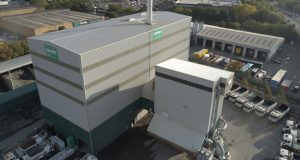Q: What was your first ever job?
I was in full time education and fencing at weekends until I was 21, so my first job was a summer one, working in a pub kitchen making sandwiches. I had to take my basic food hygiene and then clean down the kitchen after service.
Q: What was you first job in the FM sector?
I was a Business Services Manager working on the PRIME portfolio for Land Securities. We didn’t have to deal with budgets, the focus was on health and safety, customer service and service partner management. The role was a challenging one, as you can imagine, many of the properties were old and the plant was not the most reliant.
Q: How did you progress through the profession to your current role?
Hard work and not being afraid of doing things differently from others. I think you have to be able to think on your own but also know when to ask for help or listen to someone with more experience, I started off my career in a regional role and then moved into management of London properties. In each step of my career, I have always had one or two people in each organisation who has taken the time to teach and show me different ways of working or managing. That is not limited to the organisations I have worked for directly, it also includes contractors. To have a great relationship with a contractor is one of the most important parts of FM. It is within those relationships that you work as a team to be better on a daily basis and to push one another to be more effective and efficient. I am now in the enviable position of being the Head of Facilities working with a very capable team. I have no doubt that I would not be where I am today, without the help, courage and understanding of those special few who have encouraged me to be successful.
Q: Do you have any qualifications or training in FM and related areas such as health and safety? And how have you benefited from them?
I have several qualifications which I have garnered over my 15 year career. It seems NEBOSH is in high demand and I was fortunate enough that Land Securities invested in me at the start of my career. I believe that health and safety training needs to be reviewed and invested in on an annual basis. I think training within FM has become more formal in recent years which of course is necessary but to begin with, the greatest training I received was on the job training. That someone gives you that initial chance so that you are able to learn whilst doing the job is of most value. You can never learn in a class room what it’s like to deal with people which in the most is what we do.
Q: What is your greatest contribution to the FM sector, or your current role?
Well I have only been in my current role for a couple of months, so a little unfair to say I have made a great contribution just yet, but I am getting there. With regards to the FM sector, I would have to say my passion and my work ethic has been my biggest contribution. My desire to offer the best service to both clients and occupiers has, I believe helped improve standards in every property and company I have worked in, thereby educating others that FM is not simply people who look after air conditioning or cleaning but that we are influencers and professional people.
Q: What’s changed most since you started in FM?
I would have to say the prominence of FM, it is known for being a job people fell into or were promoted into. Now I think that we are starting to make strides into it becoming a career path and taken more seriously. There are now degrees in facilities management and courses which can be taken which were not available when I first started.
Q: What personal qualities do you think are most needed for a successful career in FM?
I think that being able to be a good communicator is important, being able to pick up a phone and have the hard conversations when things are not going strictly to plan. To be able to be honest and manage expectations is essential in being successful. If you keep people informed and involved then you get the best out of the situation and the people involved. To be able to continually multi-task is essential. FM is not a job where you can walk out of the door at 6pm and be done for the day, it is a constant and evolving business and I think people need to be able to do more than one thing at any one time.
Q: What would make the biggest difference to the FM sector? And how could that be achieved?
Cheapest is not always best. As FMs we are constantly spending money whether through service charges or projects. We seem to have focused decisions on financial pressures. We need to take into consideration the service we receive, the service we want to offer and the ability for constant improvement. I know procurement is a difficult job, but we need to engage FMs in the process to ensure that they are able to influence decisions allowing us to be able to provide the services needed. FMs tend to write budgets and are the best placed people to know what it is a building needs and forecast likely eventualities.
Q: Are you a member of any FM association or body and if so what benefits do you think they provide?
I am a member of BIFM, which provides advice and insight into the FM business. I attend networking events when time allows and I find these useful and have drawn upon the knowledge and contacts I have met at these events throughout my career.
Q: What advice would you give to young people coming into the profession now?
This is a career which allows you to experience something new every day. Don’t be afraid to ask questions, there are no ‘stupid’ questions and most importantly, choose a company who is willing to listen and is open to improvements and change, somewhere that you are able to grow, influence and have a voice throughout your career.
Q: What do you predict could be the main changes to the FM sector over the next few years?
I think Sustainability and Corporate Social Responsibility are going to play the largest part in any changes which FM will see in the coming years. Companies are taking far more interest in the surroundings their staff work in and we, as FMs have to find innovative and exciting new ways to show that we offer the best possible environment. This is not necessarily something which comes naturally to FMs and so we need to be looking at further training and understanding.
Q: What are the greatest challenges of working in FM?
I would have to say offering occupiers the service they require whilst feeling pressure to reduce costs. There is increasing demand for better services, instantaneous action and innovative ideas which all come at a cost and which companies wish to offer but in some cases have to be budgeted for over 3-5 years.
Q: What do you enjoy most about working in FM?
The diversity of every day. I talk to an array of people and have to deal with varying issues and no one day is the same. I have to think on my feet and enjoy the pressures that sometimes arise without warning. When you resolve problems or a member of your team says that they have had a good day, it is extremely rewarding.




